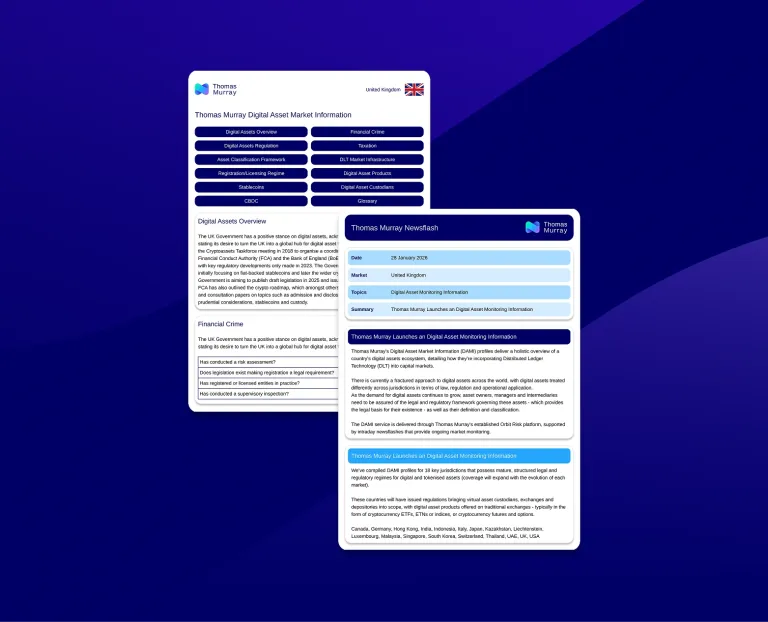Information current as of 15 October 2025
ESMA to Take on Oversight of Crypto and Stock Exchanges
The European Commission is planning to move the regulation of cryptocurrency firms, stock exchanges and clearing houses from national watchdogs over to the European Securities and Markets Authority (ESMA). ESMA believes that fragmented supervision under Markets in Crypto-Assets (MiCA) creates inefficiencies and weakens consumer protection. The initiative is already meeting resistance from smaller EU countries like Luxembourg, Ireland, and Malta, who argue that centralizing power at ESMA could harm their local financial sectors.
Romania Joins Crypto-Asset Reporting Framework
On 3 September 2025, Romania signed the Multilateral Competent Authority Agreement (MCAA) under the OECD’s Crypto-Asset Reporting Framework (CARF), committing to beginning the automatic exchange of crypto-assets transaction data by 2027. This move aligns Romania with 51 other jurisdictions already participating in the CARF initiative aimed at enhancing global tax transparency. The framework mandates standardised due diligence and reporting by financial institutions and crypto service providers, enabling cross-border sharing of financial and crypto-asset account information under the OECD’s Automatic Exchange of Information (AEOI) standard.
The DFSA Consults on Enhancing Crypto Token Regulation
The Dubai Financial Services Authority (DFSA) has issued a Consultation Paper titled Enhancements to the Regulation of Crypto Tokens. The paper outlines eight key proposals to the current DFSA-led suitability assessment for Crypto Tokens (excluding Fiat Crypto Tokens), with suitability assessments moved from the DFSA to regulated firms.
Reforms include suggestions that firms assess, publish and monitor their own lists of ‘Suitable Crypto Tokens’, with fiat-backed stablecoins still requiring direct DFSA approval. The aim of these proposed changes is to increase fund flexibility, simplify rules around business conduct, like the Key Features Document (KFD), and bring in a new monthly reporting requirement for firms.
CME Group Plans for Continuous Trading in Cryptocurrency Futures and Options
The CME Group has announced that it will introduce 24/7 trading for cryptocurrency futures and options from early 2026, subject to regulatory approval.
Key points:
- Trading will be continuous on the CME's electronic trading system, Globex, with a scheduled two-hour weekly maintenance window during weekends.
- Holiday and weekend trading will be assigned to the next business day’s trade date.
- Clearing, settlement and regulatory reporting for holiday and weekend trades will also be processed on the next business day.
Tim McCourt, Global Head of Equities, FX and Alternative Products at CME Group said: "While not all markets lend themselves to operating 24/7, client demand for around the clock cryptocurrency trading has grown as market participants need to manage their risk every day of the week. Ensuring that our regulated cryptocurrency markets are always on will enable clients to trade with confidence at any time."
Proposed Regulatory Framework for Virtual Assets Staking
The Financial Services Regulatory Authority (FSRA) of the Abu Dhabi Global Market (ADGM) has released a Consultation Paper (No. 10 of 2025) outlining the proposed regulatory framework for the staking of virtual assets (VAs). Staking is the process by which Proof-of-Stake (PoS) blockchains verify and secure transactions on their networks. The Consultation Paper builds on the previous Consultation Paper (No. 11 of 2024), which summarised the features of certain staking business models and the key risks associated with staking activities.
The aim is for staking to become a regulated activity, with appropriate due diligence, disclosure, reporting, and FSRA notification requirements for firms. Under the proposed new framework, only virtual assets approved and accepted by the FSRA can be staked. Public feedback will be accepted until 31 October 2025.
BaFin Publishes Draft of the Crypto Market Notification
Ordinance On 29 September 2025, the German Federal Financial Supervisory Authority (BaFin), published an ordinance draft on the 'Notifications and Submission of Documents under the Crypto Market Supervision Act'. This aims to outline and define reporting requirements under the Crypto Market Supervision Act. At the same time, BaFin opened the ordinance to consultation. Market participants have until 29 October 2025 to respond.
Coinbase Applies for National Trust Charter
Coinbase has applied to the Office of the Comptroller of the Currency (OCC) for a national trust company charter, becoming the latest fintech to do so. The firm, operating under the oversight of the New York Department of Financial Services (NYDFS), intends to build on its custody business, stating: “If approved, the charter would continue to open up opportunities for Coinbase to launch new products beyond custody, including payments and related services, with the confidence of regulatory clarity, fostering broader institutional adoption.”
Importantly, Coinbase has stressed that it has “no intention of becoming a bank."
Azvalor Launches Tokenised Fund with Instant Settlement in Tandem with BNP Paribas
Azvalor, the Spanish asset manager, has launched its first tokenised investment fund, with real-time settlement, under the regulatory oversight of the Spanish National Securities Market Commission (CNMV).
Launched in partnership with Allfunds Blockchain and BNP Paribas Securities Services (acting as a depository bank and fund administrator), Azvalor sees the fund as a key step towards creating modern and scalable systems for the distribution of UCITS funds, with the capability to execute and settle buy-and-sell transactions in real time, offering an efficient and transparent workflow with faster processing times.
Talos Integrates with BlackRock's Aladdin to Drive Digital Assets Efficiency
Talos, a provider of institutional technology and data for digital asset trading and portfolio management, has announced the integration of its order and execution management system (OEMS) with Aladdin, BlackRock's unified investment management technology platform. Talos and BlackRock aim to drive operational improvements within cryptoasset order management, for increased efficiency and robustness across the investment management ecosystem.
U.S Bank Selected as Custodian for Anchorage’s Stablecoin
Reserve U.S. Bank has been chosen as the custodian for reserves backing Anchorage Digital Bank’s payment stablecoins. Anchorage Digital Bank is the only crypto-native bank in the U.S. to hold a federal charter, operating under the direct oversight of the Office of the Comptroller of the Currency (OCC) and, with capabilities that extend into nearly 100 financial markets around the world, U.S. Bank is one of the nation’s largest global custodians.
Stephen Philipson, vice chair, U.S. Bank Wealth, Corporate, Commercial and Institutional Banking, said: “Payment stablecoins are an important area of exploration for institutional banking clients” with the potential to be “lower cost and faster than some traditional payment methods, particularly in cross-border payments, where the ability to move at real-time, settle instantly, and contain smart contract controls and terms can facilitate.

Digital Asset Custodian Monitoring
Our DACM solution sets a standard for transparency and risk intelligence in digital markets. Against an industry that is complex, fragmented, unstandardised, and fraught with cyber risk, our solution provides you with the tools and insights to effectively evaluate, select and monitor your digital asset custodian.
Let’s Talk
Interested in strengthening your approach to digital asset custody?
Get in touch to request a demo, or to talk to one of our experts to find out how Thomas Murray can support your risk evaluation, monitoring, and strategy execution in the digital asset space.
Insights

Why 72 hours is the New Standard for M&A Cyber Due Diligence
A decade ago, cyber due diligence sat somewhere between “nice to have” and “we’ll deal with it post-close.” That world no longer exists.

Thomas Murray Launches Digital Asset Market Information (DAMI)
Thomas Murray, a global leader in risk management, due diligence, and cybersecurity services, is proud to announce the launch of Digital Asset Market Information (DAMI).

Solving the "Scale Paradox": How to Automate Portfolio Oversight with Fewer People
In 2026, private equity technical teams are facing a "Scale Paradox": portfolios are growing in complexity, while in the internal teams responsible for operations and cybersecurity oversight, headcounts remain stagnant.

How Private Equity Hackers Choose Their Targets
Private equity firms sit at the intersection of high-value financial transactions, sensitive deal data, and an expanding portfolio of technology heavy portfolio companies – and it’s this combination that makes PE an attractive target for cyberthreat actors.

